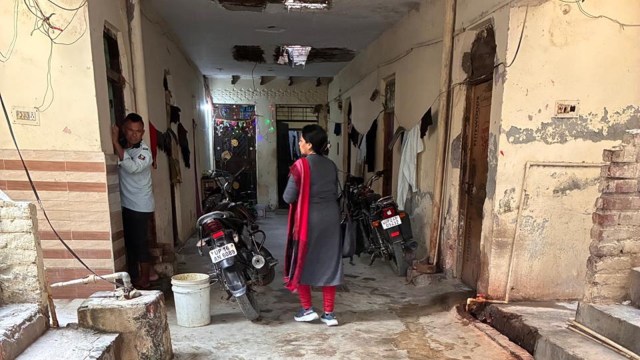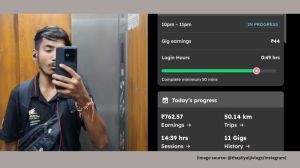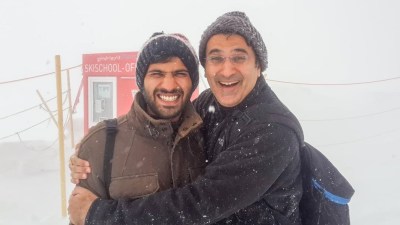One morning last week, primary school teacher Suman Lata walked along the narrow, dusty lanes of Greater Noida’s Tughlaqpur village, going from one single-storey house to the next. She carried a black bag with “Bharat Nirvachan Aayog Vishesh Pragaadh Punarikshan” stamped on it.

From door to door
Suman’s day began at 8.30 am. She went to her school to mark her attendance before heading to the village. On the day The Indian Express walked with her, Suman was collecting a bunch of the 625 forms that she had distributed earlier – forms that most electors could barely understand, but which they were required to fill in.
“I have to help them trace and match their and their parents’ details with the voters’ list from 2003,” Suman said. This information, which very few can recall, is central to determining what must be filled, left blank, or corrected in the SIR forms.
The ECI has set January 1, 2026 as the qualifying date for SIR, and filled-in forms must be collected by December 4. The draft electoral roll will be published on December 9. “I have told them to complete the forms and give them to me at the earliest,” Suman said.
 BLO Khushboo at a Greater Noida high-rise. (Express photo by Saman Husain)
BLO Khushboo at a Greater Noida high-rise. (Express photo by Saman Husain)
A local anganwadi worker is helping Suman. “She knows many families, and she has helped me identify 10 of them today. It is not easy to find the homes of people when addresses are not clear,” Suman said.
Sitting on a cot in the local anganwadi centre, 30-year-old Aman Kaur struggled with the form.
Story continues below this ad
“No, no, you do not have to write in this column. That is why I had sent you the list. Check carefully before writing,” Suman chided her gently, applying whitener over the writing.
“We will look for father’s details… You are only 30, so you could not have voted in 2003. You have to show that at least one among your father, mother, maternal or paternal grandparents voted here,” she explained.
It was the same in almost every home – Suman asked them questions, explained things to them, and helped them fill in their forms. In between, she took calls on her mobile phone from others with their own sets of problems. Someone was panicking because they had different dates of birth on their Aadhaar and Voter ID, and Suman had to remind a daughter-in-law that it was the details of her parents that were needed, not her in-laws’.
On her earlier visit, Suman had left behind two copies of the SIR form with each elector. Kuldeep Singh told her he had lost them both. “I can’t remember where I kept them. Will you give me another form?”
Story continues below this ad
Suman told Kuldeep to look harder, and moved to the next house, where 39-year-old Shiv Kumar demanded to know why he had to go through all of this. “You cannot vote if you do not fill this form,” she told him.
Confusion, questions
At 10 am in the third-floor clubhouse of Purvanchal Royal City housing society in Greater Noida, the blue leatherette couches were full. The BLO, also a government school teacher like Suman, sat at a table, answering questions from residents, many of whom clutched old documents.
This BLO, Khushboo Rai, is a resident of the society, and has the numbers of other residents saved in her constantly-buzzing phone. “Clubhouse mein hoon, paanch baje tak rahoongi,” she told someone. To someone else, a parent from her school, she said, “Election duty pe hoon.”
The profile of electors here is different from those in Tughlaqpur village, but the questions they asked were similar. Many residents were migrants, retirees, and tenants whose addresses had changed frequently, and very few of whom had clear memories of voting in 2003.
Story continues below this ad
“We are facing a lot of difficulties in finding people’s details… many don’t have anything from the last SIR,” said Khushboo, looking at an unresponsive Electoral Search window on her phone. “Woh (Election Commission) site hi nahi khul rahi hai… check kaise karein?” She asked another BLO appointed by the Greater Noida Authority to assist her.
Budh Pal (59) said he hadn’t voted “for many years”, and had lived in Bijwasan, Mahipalpur, and Karol Bagh in Delhi, and in Gurgaon before moving to Greater Noida. “Ye 2003 ki details hain?” Khushboo asked him, checking his papers. “Ye toh 2008 ke hain, uncle.”
She tried to search for Pal’s Delhi records online. They did not appear.
Retired civil servant Aryama Sanyal (65), told the BLO her voter ID was of Jaipur, and those of her son and daughter-in-law were of other states. “But we live here and want to vote here.” Khushboo explained to her that Sanyal would have to start by getting her name deleted in Jaipur.
Story continues below this ad
Sanjay Verma (43) said he pretty much had no details to supply. “I didn’t vote in 2003. And who remembers their parents’ details these days?”
Another resident, Sapna, complained she had been trying “on the website but no details are appearing”. A woman with her said she had realised why she had been unable to find her mother’s details: “Her name was misspelled, even though her Voter ID has the correct spelling.”
Pritam Singh (45), the Greater Noida Authority BLO, said he and his colleagues had been visiting housing societies since November 4. “Sometimes we have to ring the bell 10 times before someone opens the door. But we wait till someone answers…. koi kachcha kaam nahin karna hai.”
Khushboo said she had been asked to go to her school for an hour on top of the SIR duty. “I refused. I am already overworked. An entire room in my home is filled with documents. Keeping these papers safely is a big responsibility,” she said.
Story continues below this ad
She had arranged forms in neat piles – one of those whose voter data could not be found online, another of residents marked for deletion because they were dead or had moved, a third of people who were yet to respond with the filled-in forms.
A queue was forming in front of her. Her phone was ringing. She shuffled her papers. And muttered absentmindedly about having to be away from her family for long hours every day: “Meri bachchi ka Board exam hai…”



 BLO Khushboo at a Greater Noida high-rise. (Express photo by Saman Husain)
BLO Khushboo at a Greater Noida high-rise. (Express photo by Saman Husain)





